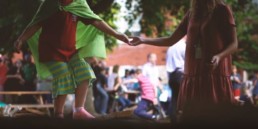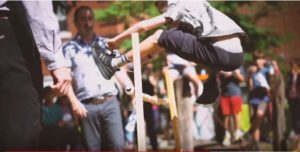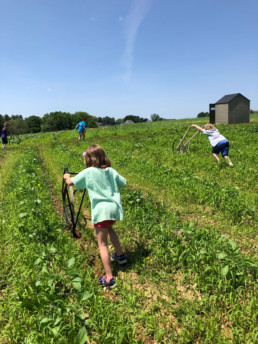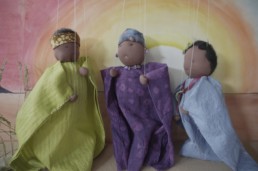A Festival of Courage and Hope
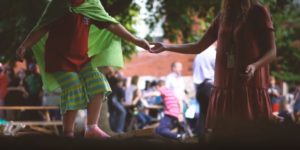

The Susquehanna Waldorf School gymnasium vibrates with the rumble of drumming and the stomps of a fierce dragon. He marches, each heavy foot falling with the beat, towards Saint Michael at the center of the floor, standing bravely with his sword. The dragon lunges as his shadow falls over the brave warrior, knocking him back. A hush falls across the surrounding villagers. In a moment, though, Saint Michael is on his feet again, and as the day settles into dusk, worries of the fearsome, destructive dragon are dissolved with the dragon’s defeat. Hope prevails.
The dragon, of course, isn’t a real dragon—it is Class 3, skillfully cloaked in layers of silky fabric—and Saint Michael isn’t the archangel himself but a brave student draped in a red cape and sparkling golden crown. The festival of Michaelmas honors Saint Michael, an archangel in Judaism, Christianity and Islam, and is observed by people of all faiths and spiritual paths. Waldorf schools around the world recognize this festival, which underscores the importance of overcoming fear and strengthening resolve, of finding the courage to face both internal and external dragons. That Michaelmas is celebrated near the autumn equinox is no coincidence: marking the diminishing daylight, close of the harvest, and shifting of seasons in the northern hemisphere, the festival comes at an appropriate time to remind students that they must endow themselves with courage and fortitude for the cold, dark days of winter ahead. Held near the beginning of the school year, the symbolic gesture towards the new journey of the year ahead is also significant, as each student takes on their own challenges.
After the Michaelmas play, students head outside for a series of field games and activities that focus on courage. The activities meet each student at a developmentally appropriate age: the younger children, for instance, balance a small pebble on a wooden sword as they tightrope a circle of logs; older students wield a javelin to collect large wooden stars; and all ages sprint to leap as high as they can over the high jump (with the bar rising after each success). The closing event, however, remains the favorite: an energetic tug of war that tests the strength and striving of students as they work together. It is through these efforts that students discover new inner resources to help them grow towards life and light, for now and into adulthood.
“Michaelmas is about rising, physically, to face your inner battles, your inner ‘dragons’,” says Class Five teacher Salvatore Martino. “This is a common theme in stories, from the fairy tales to the Norse mythologies.” In Waldorf education, it is these teachings of parallel stories to our own human challenges that speak to students in a symbolic way, identifying with a need shared by all for truth and for justice.
NatalieRauch, SWS Parents
After living away for thirteen years, we decided to move back to our hometown. Susquehanna Waldorf School provided us with comfort, support, and a sense of family during a very difficult time in our life. SWS is the very best decision we could have made for our family- our children are finally happy to go to school every day!
- Natalie Rauch, SWS parent- Grades 1 & 2
The Carlisles, SWS Parents
When I first walked through the entrance to the Waldorf School, I felt at home. I knew my daughters would be cared for. And I was right. They have learned, grown and matured into the young women they are today. Their maturation and growth (spiritually, emotionally and intellectually) is partly the result of a curriculum focused on the child’s developmental readiness. Couple the curriculum with small classes and a loving family spirit via their teachers, they learn how to cooperate as they make decisions, yet are able to compete when needed. Waldorf education has enabled my children to embrace the wholeness of who they are. Dare I ask for more—maybe a high school?
- The Carlisle’s, SWS parents
Frank and Jessica Meyer
We want our daughter to grow up to be a woman of strong mind, body and soul. Waldorf education teaches excellence in academics, richness in the arts and music, respect of our natural world and reverence for our fellow mankind. Waldorf teachers make learning come alive both mentally and physically. Social skills take hold so that our children flourish. This profound Waldorf education will serve our daughter for a lifetime--our gift to our child.
The tradition of class trips
“We LOVE to weed!” exclaim several second graders in Susquehanna Waldorf School teacher Rochelle Dietz’s class as they pluck the unwanted weeds from the soil at Heritage Creek Farm & Educational Center. The students, visiting the Center for their year-end class trip, are getting a taste of next year’s third grade curriculum on farming and gardening.
Multi-day curricular class trips in Waldorf education serve to expand the students’ world through hands-on experiences and direct observation. It is an active form of learning that corresponds to the classwork and deepens the understanding and relationship with the material. Class 4’s study of local history and geography, for instance, culminated in a trip to Ricketts Glen to experience the spectacular waterfalls and scenery of the Red Rock and North Mountains, as well as exploration of the region’s rich history of the once-booming coal mining industry.
But it’s not just the educational content that makes these trips so invaluable to the student’s growth.
From first through eighth grade, the students engage in progressively more challenging adventures, allowing them to not only use their knowledge in a contextual manner, but also to overcome their limits and expand their perspective. Things can get a bit uncomfortable at times. Class 4 learned this on their first night of camping at Ricketts Glen, when temperatures dipped and the skies unloaded heavy rains. Class 6 stepped out of their comfort zone and into the busy streets of New York City. And Class 7 uncovered new heights of self-discovery, overcoming fears and forming new pathways of trust with their classmates on a high ropes course.
While across the nation field trips are being eliminated from school district’s budgets, experiential learning through class trips remains steadfast at SWS, a tradition that will continue to instill a real confidence in its students, from the rich earth of a farm field to the skyscrapers of Manhattan. “We don’t just want our children to acquire work skills from their education,” writes Julia Ryan of The Atlantic, “we also want them to develop into civilized people who appreciate the breadth of human accomplishments. The school field trip is an important tool for meeting this goal.”
of fiber & folktales
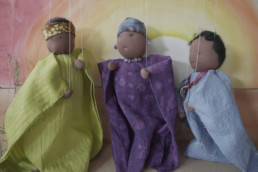

In Fiber Arts teacher Barbara Freiberg’s classroom, Susquehanna Waldorf School’s Class 7 students busily transform lengths of thread and swatches of fabric into playful marionettes for their May performance of “Folktales from Africa.” The work is fun—but it is also grounded in the classwork and the student’s developmental needs.
The marionette play is, as all class plays in Waldorf education are, connected to one of the curriculum blocks. For Class 7, the “Folktales” play reinforces and enriches their study of Africa. Touching on geography, culture and people of the different African regions, the marionettes, alongside other art-centered projects, carry the goal of a deeper experience with the subject matter.
In addition to bringing the curriculum to life, class plays at SWS meet students where they are developmentally and seek to address the struggles felt by the particular age group. Class 7 students entering adolescence, a stage of heightened self-awareness, find comfort in their role working with marionettes, as they can reveal their character behind the scenes instead of out in the spotlight. The teacher is able to stretch the skills and capacity in students this way, but from a place that is comfortable for their age. The play also strengthens the sense of interdependence among the whole class, and uncovers a new appreciation for each other.
As each puppet dances lightly from the marionette strings, Class 7 students smile and recite the lines they have worked diligently to memorize. How they enter their character and respond to each other through practice prepares them for their performance, as well as their final eighth grade production in the coming year, but it also prepares them for life—a gift that goes well beyond the stage.

